Who are you and what do you do?
I’m Ashley Vassar. I graduated from Ohio Wesleyan University in Spring 2016. I majored in English (Literature concentration), Classics, and Medieval Studies. In December of 2018, I earned my Master of Library and Information Degree from Kent State University’s School of Library and Information Science. I am currently employed at a public library in the Columbus area as an Outreach Associate.
How did you become interested in librarianship?
Up until my senior year at OWU, I fully planned to pursue a PhD in English; however, after being warned about the realities of the job market, I decided to look at other options. I looked inward to distill exactly what had made me want to pursue a PhD in the first place. Three truths stood out:
- I am passionate about continuous learning.
- I love helping others and seeing what they are passionate about.
- I wanted to work in a profession where I could make a difference in the lives of others.
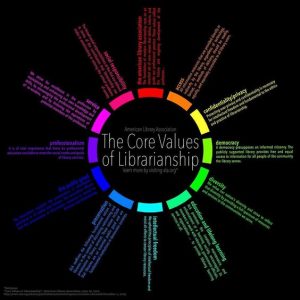
With the guidance of my OWU professors, I realized that a job in a library would be perfect for me. The American Library Association’s Core Values include values like: Education and Lifelong Learning, The Public Good, Service, Access, and Diversity. It was clear that a career in libraries would reflect my own values.
What was it like applying to library schools, and what factors influenced where you applied?
The application process was pretty simple for me. In Ohio, we are lucky to have Kent State University, which is known for its fantastic Master of Library and Information Science program. The program also has professors whose offices are in the State Library of Ohio, which is in Downtown Columbus. I was able to schedule a meeting with one of these professors and talk about the program. It is entirely online now, with the option of attending weekend-long workshops that build specific practical skills. Since I would also be working and wanted to live with my parents to save money, it was the perfect option. I did not apply to any other schools, since I had heard great things about this program and I was eligible for in-state tuition.
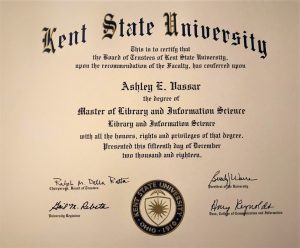 Kent State University’s Master of Library and Information Science program offers 14 areas of specialization, but they are not formally declared. This means that you can change your track of study at any point throughout your degree program without it meaning that your degree will take longer to complete. When I first went into the degree program, I thought that I would specialize in Academic Librarianship; however, I also accepted a job in a public library during this time. Once I began working in a public library, I became aware of just how much libraries can do to bridge the gap of accessibility to knowledge and resources for members of the general community. They can especially make a difference in the lives of individuals who experience poverty or homelessness.
Kent State University’s Master of Library and Information Science program offers 14 areas of specialization, but they are not formally declared. This means that you can change your track of study at any point throughout your degree program without it meaning that your degree will take longer to complete. When I first went into the degree program, I thought that I would specialize in Academic Librarianship; however, I also accepted a job in a public library during this time. Once I began working in a public library, I became aware of just how much libraries can do to bridge the gap of accessibility to knowledge and resources for members of the general community. They can especially make a difference in the lives of individuals who experience poverty or homelessness.
My interest in the way that libraries act as a social safety net led me to educate myself on what libraries can do to help children experiencing poverty or homelessness. These children can quickly fall behind their classmates and statistics show that children not reading on grade level by the end of fourth grade become less likely to graduate high school. Luckily, there is room for library intervention through free programming and resources, homework help, and storytimes. The more I read and experienced, the clearer it became that I wanted to work with children and teens. I began tailoring my courses to fit that goal and became equally impassioned about the importance of diversity in literature–specifically the literature intended for children and teens.
How did being a library school Masters student compare with being an undergraduate?
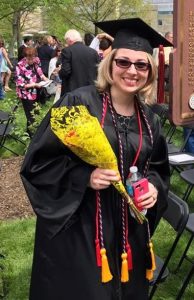 I found library school to be much easier than being an undergrad at OWU. I do not mean that the program was not rigorous–it was–but that I was a much better student. I paid by the class, so I was able to take just two classes at once and really focus on excelling in those courses. The online class format meant that I did not have to juggle a class schedule, work schedule, and finding time to finish my assignments. I also did not have the distractions of living on campus with other students. That meant that I was able to put 100% into every assignment that I turned in and complete every reading assigned. It also helped that I was 23 when I started the program. There’s a lot of development still happening in the brain between 18-25 and I’ve found that, since completing undergrad, I’m much better at both time and stress management.
I found library school to be much easier than being an undergrad at OWU. I do not mean that the program was not rigorous–it was–but that I was a much better student. I paid by the class, so I was able to take just two classes at once and really focus on excelling in those courses. The online class format meant that I did not have to juggle a class schedule, work schedule, and finding time to finish my assignments. I also did not have the distractions of living on campus with other students. That meant that I was able to put 100% into every assignment that I turned in and complete every reading assigned. It also helped that I was 23 when I started the program. There’s a lot of development still happening in the brain between 18-25 and I’ve found that, since completing undergrad, I’m much better at both time and stress management.
What’s most fulfilling about working as a librarian?
The most fulfilling part of library work is knowing that you are making a difference in the lives of members of your community. For example, in my current position in Outreach, I take library materials and services to homebound individuals, and those who live in nursing homes, assisted living, and senior citizen housing. I often hear how much our service means to these individuals who, otherwise, would not be able to get to the library to make use of our materials. For someone unable to leave their home or living in a nursing home, the library can be a connection to the outside world. As English majors well know, books and movies open up entire worlds through the “power of imagination,” as it is said. We also offer technology help to our patrons. This can be anything from setting up a CD player so that a patron with poor eyesight can listen to audiobooks, or more in-depth help with computers, tablets, and phones. I recently taught an older lady how to save pictures from her email onto her iPad so that she could always have access to photos of her late husband and her children and grandkids.
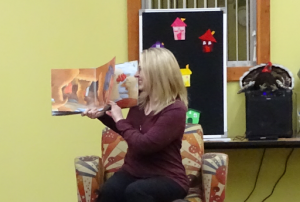
Lastly, we also take storytimes to daycares and preschools and select picture books to go to those schools. Unfortunately, not every child’s parents will bring them to the library or have the time and resources to do so. In position, I have the unique opportunity to ensure that those children still benefit from their library, even if they never get to visit it in person.
While these are examples from my own position, every job in a public library ultimately benefits the public–whether it is shelving books, offering programs, or cataloging those books so that the patrons can access them and check them out. Knowing that you are making a difference is huge and it is the reason I do what I do.
What’s most challenging about working in a library?
 I think the most challenging part of working as a librarian can be taking your own personal beliefs out of what you do. While there are opportunities to assert your values, libraries are against censorship and support intellectual freedom, which means protecting access to ideas you may not agree with. I can put together diverse displays, ensure diverse storytimes, and make certain that the programming I offer reflects my values, but I cannot stop patrons from accessing items that may conflict with my beliefs. A very smart person once told me, “A good library should have something that offends everyone.” By protecting the beliefs of patrons that I may disagree with, I am also protecting the materials that align with my own values. As a tax-payer funded institution it is important to balance neutrality (which ensures that important materials will not be removed from the library) with making certain that the library is a welcoming environment for everyone.
I think the most challenging part of working as a librarian can be taking your own personal beliefs out of what you do. While there are opportunities to assert your values, libraries are against censorship and support intellectual freedom, which means protecting access to ideas you may not agree with. I can put together diverse displays, ensure diverse storytimes, and make certain that the programming I offer reflects my values, but I cannot stop patrons from accessing items that may conflict with my beliefs. A very smart person once told me, “A good library should have something that offends everyone.” By protecting the beliefs of patrons that I may disagree with, I am also protecting the materials that align with my own values. As a tax-payer funded institution it is important to balance neutrality (which ensures that important materials will not be removed from the library) with making certain that the library is a welcoming environment for everyone.
Do you have a favorite story or anecdote from your degree or on the job?
I’ve had a lot of really wonderful experiences while working in public libraries. I’ll share a few.
The first anecdote repeats on a regular basis. Part of my job as an Outreach Associate is taking storytimes to preschools and daycares. I do several of these a month and there is almost always a class that starts what I call a “hug pile.” As you may know, children often copy one another, so if one child decides they want a hug, a least five more also want hugs. I have almost fallen down a couple of times! I am just always so happy to see children excited about the library and the stories I bring.
Similarly, during my MLS practicum internship–a 150-hour internship that I completed in the Youth Department of another local library–I assisted with a Halloween-themed storytime. Halloween is my favorite holiday, so I went all out with my costume. I was a “candy corn witch.” It was a corny (ha) and child-friendly costume and several parents asked to get a picture of their children with me. I wore the costume to work the following day and the same thing happened there!
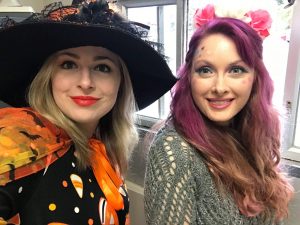
Lastly, I helped cover a desk in Customer Service when they were short-staffed. Because the floor in our Media department was being redone, the Media desk had been moved to a hallway and a low to the ground table was being used for a desk. One thing you learn when working with children is that they are more likely to talk to you if you are on their eye level. It was a slow night and I did not have anything pressing that needed to happen in that hour besides assisting any patrons who approached me. A young boy struck up a conversation with me and proceeded to explain that he was eight years old, Eminem was his favorite rapper, Rob Zombie was his favorite rock musician, and he loved Skyrim. He also told me that he loved the Goosebumps books and had read all of Harry Potter. I really enjoyed getting to talk to this child, because I knew he came to the library for several hours at least once a week. It always good to get to know any library regulars. I also thought it was pretty funny that he loved Skyrim, a game that originally came out the year he was born. It made me feel a little old to realize that I had been playing this game as long as he had been alive.
What do you think is the most common misconception about library work?
I think the biggest misconception is that public libraries are quiet environments. Libraries now serve as hubs for communities and, because of this, they are rarely quiet. While most libraries do have designated quiet spaces, other areas can be quite loud!
I think people also often misunderstand what librarians do or the amount of education that the job requires. A lot of people are surprised to learn that most librarian jobs require a master’s degree. People still think that librarians just staff service desks, read all day, shush people, grudgingly answer questions, and check out books. The job is so much more involved than that and librarians are always happy to help! People do not realize that librarians plan programs, foster community partnerships, offer information literacy training, technology help, ESL classes, and many other opportunities to their communities. Working with the community is the most rewarding part of the job and library employees never want a patron to feel like they are interrupting us to ask for our help! I would much rather be actively helping a patron than sitting at a desk doing nothing.
Any future plans or aspirations in library science?
My current goal is to find full-time employment as a librarian. I love my current job as an Outreach Associate, but now that I have finished my degree, it is time to search for a job that requires it. I have not ruled out the possibility of something opening in the library where I already work. There is a lot of movement in the library world, especially now that the oldest of the baby boomers are retiring–management jobs are opening up and librarians who have been in the workforce for a few years are moving into them. That means that entry-level librarian positions come open pretty frequently, even if there are a lot of applicants for those positions.
I am also currently serving on the Over the Rainbow Book List. It is a Book List from the Gay, Lesbian, Bisexual, and Transgender Round Table of the American Library Association and the purpose of the book list is to compile books that genuinely reflect the LGBT experience and are meant for general adult readers. I am really excited to be a part of reading the nominated books and selecting which books will be on the final list!
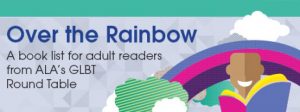
Any advice for current OWU students interested in possibly pursuing library work?
I think a lot of people who are interested in working in libraries, at least public libraries, underestimate the amount of social interaction required for the job. Many introverts go into library work and, as an extrovert, I have witnessed first-hand the amount of burn-out my coworkers can experience from the constant social interaction required of customer service heavy jobs. But there is a place for everyone in the library world, so I recommend striving for high self-awareness before choosing a path, so you can find the one that matches your temperament.
If you are someone who loves interacting with strangers on a regular basis and thrives in busy, sometimes stressful, environments, then I recommend going into public librarianship. If you are someone that is passionate about helping the community, making a difference for individuals, loves instruction and planning, and can handle the social aspect of the job, even if it is not your favorite, then I recommend public librarianship.
If you are appalled by the idea of speaking in front of a crowd, making phone calls, or interacting with strangers on a regular basis, but are still interested in library work, then I recommend looking cataloging and the technology involved in libraries. These are jobs that commonly require less interaction with the public, but still benefit that public in the end. There is a lot that you can do with an MLIS that is not working in a public library. There are academic libraries, corporate research libraries, and many others. You do not know what options are out there until you look!
Lastly, I recommend being willing to start at the very bottom. Many libraries want their employees to have experience in every job. This means that, even with a college degree, you may be expected to start out shelving books before you can be promoted to a more involved job opportunity. For traditional public librarianship, customer service is also well respected. If you cannot get a job in a library right now, then look into retail opportunities. If you can handle the stress of retail, then you will thrive at a public library!
Good luck!

